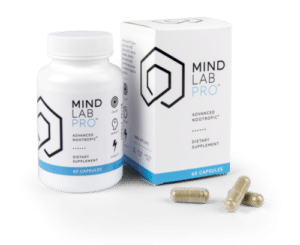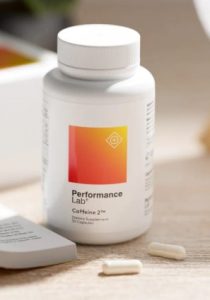Table of Contents
 For those of us in the world of writing, the search for ways to boost enhanced creativity and sharper skills is unending. That’s when the potential of nootropics for writing caught my attention.
For those of us in the world of writing, the search for ways to boost enhanced creativity and sharper skills is unending. That’s when the potential of nootropics for writing caught my attention.
These cognitive enhancers have been shown to heighten focus, improve memory retention, and even enhance cognitive function. Imagine harnessing your creativity and producing some of your finest work!
In this guide, you will be introduced to the best nootropics for writers and how they can help you to boost your creativity and push your productivity to levels you’ve only imagined.
Let’s get started on the best nootropics for writing.
Key Takeaways
- Nootropics such as Aniracetam and CDP-Choline can be pivotal in sparking creative insights and banishing writer’s block.
- Ingredients like Caffeine and L-Theanine combined are a natural nootropic stimulant without the crash often associated with prescription stimulants.
- Ginkgo Biloba and Ginseng augment memory, cognitive agility, and holistic brain wellness.
- A carefully selected nootropic stack can boost your creativity and productivity when dosage recommendations are closely followed.
 The Promise of Nootropics for Writing
The Promise of Nootropics for Writing
First, to understand how nootropics can boost your writing ability, we’ll need to take a look at the neuroscience of how and why these supplements work.
But not to worry because I’ve translated the techno-speak of clinical studies so that it’s easier to comprehend. Because we don’t want to get lost in the weeds. We just want something that works!
Nootropics are simply dietary supplements that support every form of brain health and cognition. Also referred to as cognitive enhancers, nootropic supplements can elevate brain performance and function, boost memory, concentration, creativity, and overall mental prowess.
Once you grasp the potential of nootropics on neural chemistry, you’ll soon be able to choose your best nootropics for writing.
Nootropics function by modulating or increasing brain neurotransmitters such as dopamine, serotonin, and acetylcholine, which are instrumental in mood regulation, concentration, motivation, and learning and memory.
By supporting neurotransmitter levels in your brain, and increasing brain blood flow, nootropics can amplify the cognitive aspects associated with writing.
But keep in mind that there is no “one-pill” solution. And caution is advised because these natural nootropic supplements are powerful. Each of the nootropics I introduce you to next may not work for every person.
And some are contraindicated with prescription anti-anxiety and antidepressant meds. It is critical that when considering adding a nootropic to your supplement regimen that you first read the full Side Effects section for each full review that I link to below.
While hundreds of peer-reviewed clinical studies vouch for the benefits provided by each supplement described below, if in doubt, please check with a medical professional who understands how nootropics work.
With careful planning and a willingness to try new supplements, you’ll be well on your way to better writing and enhanced creativity.
Supercharging Creativity for Better Writing
Harnessing nootropics to turbocharge creativity can have a profound effect on your writing skills. Like many writers, I’ve grappled with increasing my writing pace and evading writer’s block. But adding the right nootropics into my regimen has been transformational.
For boosting creativity, several nootropics can be instrumental. Aniracetam, for example, is known for boosting cognitive function and creativity. By promoting how dopamine and serotonin work in your brain, Aniracetam helps with concentration and flow, making idea generation easier.
Another potent creativity-enhancer is L-Tyrosine. A precursor to dopamine and norepinephrine synthesis, L-Tyrosine enhances working memory, executive function, creative flow states, reduces stress, improves mood and is anti-anxiety.
Blending these nootropics into your daily rhythm can remarkably refine your writing journey, supercharging creativity and navigating challenges like writer’s block. But creativity isn’t the sole ingredient; heightened attention and focus are equally pivotal to a writer’s toolkit.
Boosting Focus and Concentration for Writing
 To hone your focus and attention span, integrating specific nootropics can be a game-changer. For better focus and deeper concentration, you have several nootropic supplements to choose from.
To hone your focus and attention span, integrating specific nootropics can be a game-changer. For better focus and deeper concentration, you have several nootropic supplements to choose from.
A time-tested favorite for more focus is Caffeine. By inhibiting adenosine receptors, caffeine can elevate alertness and concentration. Whether you are getting your caffeine from coffee or a supplement, Caffeine can be the extra push you need for better writing productivity.
Another focus-enhancing supplement is L-Theanine.[i] Naturally occurring in green tea, L-Theanine helps boost GABA, serotonin, and dopamine in your brain. And boosts Alpha and Theta brain waves which are associated with relaxation and better concentration.[ii]
And traditional herbs like Ginkgo Biloba and Ginseng have centuries of use backing their cognitive enhancement claims. These nature-derived solutions show promise in tackling writer’s block, enhancing memory and recall, reducing mental fatigue, and helping nurture better overall brain health.[iii]
However, it’s vital to remember that nootropics alone are not miracle cures. Better quality sleep and a healthier diet by avoiding processed foods are also needed for optimal cognitive health. This blend of nootropics with healthier lifestyle choices can produce amazing results and help you be a more creative and productive writer.
Elevating Memory and Cognitive Ability for Writers
Centuries-old solutions like Ginkgo Biloba and Ginseng are nature’s nootropics for cognitive and memory enhancement. These herbal powerhouses have seen a surge in popularity as more and more people search for methods to enhance brain function and mental clarity.
As a writer, my quest for better and more productivity led me to these herbs, and they’ve proven invaluable.
Here’s a snapshot of the benefits of integrating Ginkgo Biloba and Ginseng:
- Memory Boost: Both are renowned for enhancing memory and recall through improved cerebral blood flow, fostering neural communication, and protecting and repairing brain cells.
- Cognitive Enhancement: They support cognitive function, better focus, deeper concentration, and more creativity. This implies sharper problem-solving acumen, agile thinking, and heightened creativity.
- Productivity Upsurge: With better memory and cognitive function, they can help maintain concentration over extended periods while avoiding mental fatigue, leading to more and better writing capacity.
Tailoring Nootropics to Your Writing Demands
For those seeking a natural method for boosting your writing ability and speed, choosing the right nootropics is key.
To simplify your choices, here’s a comparative snapshot of three of the best nootropics to enhance writing ability and productivity:
| Nootropic | Perks | Potential Downsides |
| Caffeine | Heightened alertness, improved concentration | Restlessness, mood swings |
| L-Tyrosine | Memory enhancement, creative flow states | Increased blood pressure, irritability in some |
| CDP-Choline | Elevates brain performance, boosts cognitive function | Insomnia, headaches, nausea |
With a clear picture of each nootropic’s advantages and potential concerns, you’re better equipped to make an informed selection. However, always read the Side Effects section of each full review that I link to and make sure a supplement choice is not contraindicated with any prescription meds you are using.
 What are the Best Nootropics for Writing?
What are the Best Nootropics for Writing?
These are the best nootropics for writing and are in my personal nootropic stack that I have used every single day for many years.
Aniracetam – 750 mg twice per day – releases 200 – 300% more acetylcholine in the brain. Which can increase focus, and clarity of thought.[iv] And can reduce anxiety, depression, and fear. And increase sociability.[v]
Caffeine – 200 – 400 mg per day – is an adenosine antagonist which influences acetylcholine, epinephrine (adrenaline), serotonin and boosts the use of dopamine which provides a stimulant effect.[vi] Even in the most adverse circumstances, moderate doses of caffeine can improve cognitive function, including vigilance, learning, memory, and mood state.[vii]
CDP-Choline – 300 mg twice per day – enhances the release of norepinephrine, dopamine, serotonin, and boost production of acetylcholine in the brain.[viii] Increases cerebral blood flow, and improves learning and memory.[ix]
Gingko Biloba – 120 – 240 mg per day – increases cerebral blood flow for improved memory, recall, cognition, and learning.[x] And acts as a MAOI which helps reduce anxiety and the symptoms of ADHD.[xi]
Ginseng – (3-5% ginsenosides) 100 – 400 mg per day – is a serotonin and norepinephrine reuptake inhibitor (SNRI). Working as an antidepressant and helping with some symptoms of ADHD.[xii] Many users of Ginseng report that it can boost performance on mental arithmetic, concentration, and memory. Ideal for a writer’s nootropic stack!
L-Theanine – 100 mg 3-times per day – boosts alpha brain waves (8-12Hz) promoting alert relaxation.[xiii] And theta brain waves associated with creativity and relief from trauma. And it boosts the neurotransmitters serotonin, dopamine, and GABA in your brain. As well as increasing Brain-Derived Neurotrophic Factor (BDNF) and Nerve Growth Factor (NGF).[xiv] Helping to relieve stress, improve cognition, boost mood and cognitive function.
 L-Tyrosine – 500 mg twice per day – a precursor to the synthesis of dopamine and norepinephrine and thyroid hormones. Supplementing with L-Tyrosine can help improve decision making, ‘flow state’ and creativity, cognitive flexibility, and working memory.[xv]
L-Tyrosine – 500 mg twice per day – a precursor to the synthesis of dopamine and norepinephrine and thyroid hormones. Supplementing with L-Tyrosine can help improve decision making, ‘flow state’ and creativity, cognitive flexibility, and working memory.[xv]
You can save money and the number of nootropic capsules you use to support your writing by getting a high-quality, pre-made nootropic stack.
My favorite is Mind Lab Pro® which contains N-Acetyl L-Tyrosine (NALT), CDP-Choline, and L-Theanine along with 8 additional brain enhancing ingredients in 2 vegan-friendly NutriCaps® capsules.
 And effective dosages of Caffeine, L-Theanine, and L-Tyrosine by using Performance Lab® Caffeine 2 in one vegan-friendly NutriCaps® capsule.
And effective dosages of Caffeine, L-Theanine, and L-Tyrosine by using Performance Lab® Caffeine 2 in one vegan-friendly NutriCaps® capsule.
Get: Mind Lab Pro®
Try: Performance Lab® Caffeine 2
Frequently Asked Questions
Are Nootropics Suited for Long-Term Cognitive Enhancement?
Each nootropic for writing supplement detailed in the above article are considered non-toxic and safe to use. While no one is wiling to pay to test their long-term use in peer-reviewed clinical studies, many of us have been using these supplements at least twice per day for many years with no problem.
Can Nootropics Be the Panacea for Writer’s Block?
The nootropics above have been shown to elevate writing creativity and improve focus. Consistent daily use should help you avoid writer’s block.
What Potential Repercussions Can Arise from Nootropics?
The nootropics described in this article are considered non-toxic and safe to use by most people. But you must read the Side Effects section I link to for each supplement above. And make sure the supplement you are considering is not contraindicated with any prescription meds you may be using.
How Swiftly Can Nootropics Reflect Their Writing Benefits?
Each of us is unique in our body chemistry and this may affect how quickly you respond to a particular nootropic supplement. Amino acids such as L-Tyrosine can begin providing its nootropic benefits within 20 – 30 minutes of taking the supplement.
Another example, the nootropic stack combo of Caffeine + L-Theanine can increase your reaction time, information processing speed, working memory, and improved sentence verification accuracy with the first dose and within 30 minutes.[xvi]
Any Natural Alternatives to Nootropics for Writing Enhancement?
The nootropic supplements introduced in the article above are natural alternatives for writing enhancement.
Final Thoughts
The success of Nootropics Expert® over the last few years has been possible because I use these supplements to support my writing.
Nootropic supplements are powerful cognitive enhancers that have been shown to work in many peer-reviewed clinical studies.
And this is verified by thousands of user reviews from others who have discovered the benefits of these supplements and use them daily.
If you are dealing with creativity problems, writer’s block, or motivation issues I highly recommend trying the nootropic supplements described in the above article.
Check my full review that I linked to for each supplement and get familiar with dosage recommendations, potential Side Effects, and the best nootropics to buy. Use them daily and consistently and watch how your writing has been given a boost like never before.
These supplements work and my work is an example of how well they benefit writers. Get started today!






Join The Discussion - 0 comments